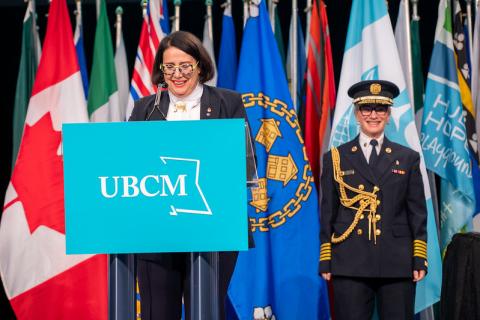Politicians expect public scrutiny as a regular part of the job, but personal attacks, especially on social media, have increased noticeably. One workshop at Convention 2024 focused on mental health of elected leaders. UBCM spent five minutes with one panelist, the Honourable Janet Austin, Lieutenant Governor of British Columbia.
UBCM: Do you think the challenge of mental health for elected officials is getting worse?
Her Honour Janet Austin, Lieutenant Governor of British Columbia: We are in an era of increasing polarization, where I think people are becoming more entrenched in their perspectives. Many people feel pressure from their peer group or from their association to maintain a rigid position. I think the environment and culture are much less receptive to exchanges where people can discuss challenging issues where there is disagreement, and really learn to listen, to make an effort to sincerely understand the perspective of the person they're speaking with, and to find places of compromise in between the extremes of public opinion.
And, I think we all know that the proliferation of social media has perhaps has enabled people to express more extreme views, and to express those views in a way which is increasingly disrespectful. Previously you would have faced pressure to identify yourself, to be associated with the position that you took.
It's a societal issue, but because elected officials are highly visible, they receive a disproportionate amount of pushback, and often very cruelly and unacceptably expressed.
UBCM: What tools and resources do you think might be available to support elected officials?
Austin: The whole focus is on, how do we actually support each other, and what are the mechanisms that might make a difference? So often, I think just having networks of support, having people that you can speak with, perhaps people who share your experience, is a really helpful thing. We're also exploring the idea of a loose pledge, where we ask people to make a commitment to, for example, your own mental health, or to support the mental health and the resilience of your colleagues and peers, or set an example publicly to speak up when you see someone being attacked in an inappropriate way, when you feel safe to do so.
UBCM: You're a person in public office. What have you've learned about maintaining your own mental health?
Austin: I'm pretty fortunate because I'm not in the crosshairs the way our elected officials are. They have to make difficult decisions on challenging and often controversial issues. If I have a challenge, it's more about volume than it is about vitriol. But things like getting regular exercise, having interests and hobbies that are outside of the day-to-day work. I like literature, I like to watch interesting movies. I love to walk and swim and be with my friends and family.
So, different people find different ways. The important thing is really to support each other. When you see someone struggling, reach out. Something I like to do myself when it comes to having a big success or winning an election, or whatever – everyone always calls the winner. I always call the loser, because I think those are the people that really need some encouragement and support.
UBCM: You’ve spoken about this idea that we don’t all need to agree, but we need to find ways to govern together in disagreement. Can you expand on that?
Austin: We have a lot of discussion right now about polarization, but what's the opposite of polarization? It’s not uniformity of opinion, because then we're just talking to ourselves. I think for a democracy to thrive, we need a robust exchange of different ideas and perspectives – as long as those ideas and perspectives are shared in a respectful way. It's part of our system. There's not just one way of doing things.
So, we train and educate people around debate and argumentation and negotiation of a certain type. I think for people listening often means waiting for someone to talk so that you can refute them, right? Instead, I think we need to actively engage with people whose views are different from our own. We need to enter those conversations with the willingness to genuinely listen, to try to understand why people hold the views that they do, and to enter with a willingness to change our minds. Otherwise, the conversation is perhaps meaningless, it becomes about who can shout the loudest.
UBCM: Why is it important for local elected officials or elected officials to talk about mental health?
Austin: I think it's leadership. It sets an example for a better, more generous way for us to deal with their challenges and engage with each other. It is a way of shifting culture, but it's also important for them. I mean, they're doing really important jobs, and if they don't have a way to actually reflect on how they're doing, we won't have the people we need stepping up to take on these roles. They'll experience burnout and that will manifest in unhealthy ways – either to their own health or to the healthy functioning of a decision-making body.

